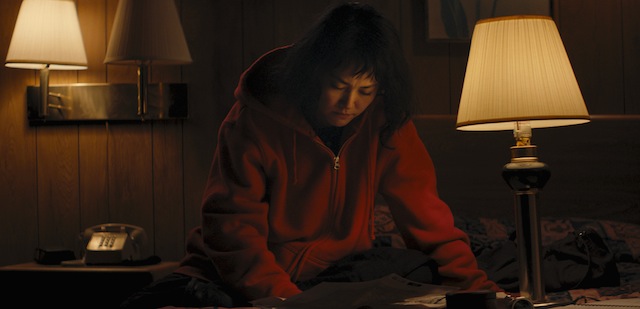‘Kumiko the Treasure Hunter’ “Kumiko the Treasure Hunter” boasts a producer’s credit from Alexander Payne, and it’s not hard to see why: It bears an uncanny similarity to his most recent film, “Nebraska.” But instead of Bruce Dern as a stubborn old-timer who refuses to admit his “winning lottery ticket” is just Publisher’s Clearing House-style junk mail, “Kumiko” offers Rinko Kikuchi as a stubborn young Japanese woman who thinks the money buried in the snow in the Coen brothers’ “Fargo” is real and intends to hit America to find it. The other, possibly even more significant difference is there’s no Will Forte sidekick to serve as the viewer’s relatively normal identification figure. We’re stuck with Kumiko. Occasionally she picks up a companion or friend, but they’re to be ultimately discarded. She’s a loner with a singleminded, completely absurd mission, and she won’t be discouraged by people telling her that, you know, “Fargo” isn’t a documentary. And the film goes along with her, right to the curious end. Distressingly, this is no mere made-up, attention-grabbing premise. “Kumiko” was loosely inspired by the real-life story of Takao Konishi, a Japanese woman who died during a similar trip to North Dakota. A series of misunderstandings led to media reports saying she was on the hunt for the “Fargo” treasure. She wasn’t, but Kumiko is. Filmmakers David and Nathan Zellner (“Kid-Thing”) don’t go as dark as the real story — Konishi’s death was a suicide — but deadpan surreality and faint melancholy are mixed; depending on how you look at it at any given moment, our hero’s plight is either depressing or silly. Not that Kumiko herself ever betrays any loneliness. She’s so antisocial that the idea of human connection never crosses her mind. She avoids coworkers, accepts help only reluctantly (including from a bumbling Minnesota cop played by director David Zellner) and her one relationship — with her trusty bunny Bunzo — is one that can be discarded with a minimum of tears. Her journey is both a joke and totally serious, and the Zellners commit to a hushed, absurdist tone that transforms both bustling Tokyo and the barren Northern American Midwest into the same arid headspace. There seems only one way to end this with any dignity, and luckily the film builds to divisive third act in which we see the true power of her obliviousness — or simply of filmmakers willing to take advantage of cinema’s ability to fulfill dreams, no matter how ridiculous and impossible they may be.
Director: David Zellner
Stars: Rinko Kikuchi, David Zellner
Rating: NR
4 (out of 5) Globes
Review: ‘Kumiko the Treasure Hunter’ is a deadpan delight

Amplify
Follow Matt Prigge on Twitter @mattprigge


















